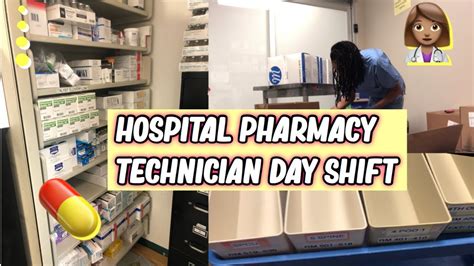Pharmacy technicians play a vital role in the healthcare system, working closely with pharmacists to ensure that patients receive the best possible care. If you're considering a career as a pharmacy technician, you may be wondering what a typical day looks like. In this article, we'll take a closer look at the daily responsibilities of a pharmacy technician and explore the skills and qualifications required for success in this field.
A pharmacy technician's day is often filled with a variety of tasks, from filling prescriptions to interacting with patients. Here's an overview of what a typical day might look like:
Morning Routine
The day begins early for a pharmacy technician, with a morning routine that includes reviewing the day's schedule and prioritizing tasks. This may involve checking the pharmacy's computer system to see what prescriptions need to be filled, as well as reviewing patient charts to ensure that all necessary information is up to date.

Filling Prescriptions
One of the primary responsibilities of a pharmacy technician is filling prescriptions. This involves retrieving medications from the pharmacy's inventory, counting and measuring the correct dosage, and packaging the medication for the patient. Pharmacy technicians must be accurate and meticulous in their work, as errors can have serious consequences.
Interacting with Patients
Pharmacy technicians also interact with patients, answering questions about their medications and providing guidance on how to take them. This may involve explaining the purpose of a medication, discussing potential side effects, and providing instructions on how to use a medication correctly.

Maintaining Inventory
Pharmacy technicians are also responsible for maintaining the pharmacy's inventory, which involves ordering medications and supplies, tracking inventory levels, and ensuring that the pharmacy is compliant with regulatory requirements.
Collaborating with Pharmacists
Pharmacy technicians work closely with pharmacists, who review and verify the work of the technicians. This collaboration is essential to ensuring that patients receive the best possible care.
Skills and Qualifications
To be successful as a pharmacy technician, you'll need to possess a range of skills and qualifications. These may include:
- A high school diploma or equivalent
- Completion of a pharmacy technician training program
- Certification as a pharmacy technician (CPhT)
- Strong communication and interpersonal skills
- Ability to work accurately and efficiently in a fast-paced environment
- Basic math skills and attention to detail
Benefits of Being a Pharmacy Technician
Working as a pharmacy technician can be a rewarding and challenging career. Here are some of the benefits of being a pharmacy technician:
- Job Stability: Pharmacy technicians are in high demand, and job stability is generally good.
- Variety: Every day is different for a pharmacy technician, with new challenges and opportunities arising constantly.
- Opportunities for Advancement: With experience and additional training, pharmacy technicians can move into leadership roles or specialize in a particular area, such as sterile compounding.
- Personal Satisfaction: Pharmacy technicians play a vital role in the healthcare system, and can take pride in knowing that they are making a positive impact on patients' lives.
Common Challenges Faced by Pharmacy Technicians
While being a pharmacy technician can be a rewarding career, there are also challenges to be aware of. These may include:
- High Stress Levels: Pharmacy technicians often work in fast-paced environments, where accuracy and efficiency are essential.
- Continuing Education: Pharmacy technicians must stay up to date with the latest medications, technologies, and regulations, which can be time-consuming and challenging.
- Limited Career Advancement: While there are opportunities for advancement, pharmacy technicians may find that career progression is limited without additional education and training.

How to Become a Pharmacy Technician
If you're interested in becoming a pharmacy technician, here are the steps you can follow:
- Complete a Pharmacy Technician Training Program: Look for a program that is accredited by the American Society of Health-System Pharmacists (ASHP).
- Gain Practical Experience: Many training programs include an internship or practicum, which provides hands-on experience in a pharmacy setting.
- Obtain Certification: While certification is not always required, it can be beneficial in securing a job and advancing your career.
- Maintain Certification: Certification must be renewed periodically, and requires ongoing education and training.






Conclusion
Working as a pharmacy technician can be a rewarding and challenging career. With the right training and certification, you can play a vital role in the healthcare system and make a positive impact on patients' lives. While there are challenges to be aware of, the benefits of being a pharmacy technician make it a career worth considering.
Call to Action: If you're interested in learning more about becoming a pharmacy technician, we encourage you to explore the resources available on our website. From training programs to certification information, we have everything you need to get started on your career path.
What is the average salary for a pharmacy technician?
+The average salary for a pharmacy technician varies depending on location, experience, and employer. According to the Bureau of Labor Statistics, the median annual salary for pharmacy technicians was $34,860 in May 2020.
Do I need to be certified to work as a pharmacy technician?
+Certification is not always required, but it can be beneficial in securing a job and advancing your career. The Pharmacy Technician Certification Board (PTCB) offers the Certified Pharmacy Technician (CPhT) credential, which is the most widely recognized certification for pharmacy technicians.
What are the educational requirements for becoming a pharmacy technician?
+Pharmacy technicians typically complete a postsecondary training program, which can last from several months to two years. These programs are offered at community colleges, vocational schools, and universities.
